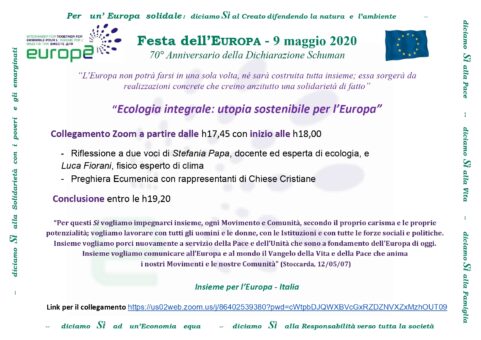A day for communities, movements and countries to meet and witness peace and solidarity among peoples May 9 is the feast day of the European continent, celebrating peace and unity among peoples. This year the Covid-19 pandemic prevented people from seeing each other in church, city squares, gatherings or conferences and prayers. This does not mean that this day’s activities were cancelled. On the contrary: with a lot of creativity, digital conferences, prayers, discussion groups and online dialogues between communities, movements and political representatives were held, for example, in Utrecht, Graz, Rome, Lyon or Esslingen.  This year’s events had the papal blessing, through a letter from Pope Francis that arrived on 22 April. The pope appreciates the service to the common good that the Together for Europe network operates through committed communities and movements, inspired by the values of solidarity, peace and justice. The Together for Europe network emerged from the historic signing on 31 October 1999 of the “Joint Declaration on the Doctrine of Justification” between the leaders of different Evangelical and Catholic movements and ecclesiastical communities from Italy and Germany. It has been a journey together to rediscover the old continent’s values of peace and fraternity. For the Feast of Europe, together with Graz, the Together for Europe committees in Italy organized and promoted an online event dedicated to a “yes to creation,” defending nature and the environment, entitled “Holistic Ecology: A Sustainable Utopia for Europe” on May 9. Through the reflections of Stefania Papa, professor and ecology expert, and Luca Fiorani, climate physicist, and a video of three messages from Pope Francis, Patriarch Bartholomew I and Antonio Guterres (UN) for the 50th World Earth Day, we are becoming more aware of how we can work together for a better present and future, respecting our Earth, in a culture of respect, cooperation and reciprocity. One of the objectives of Together for Europe, in fact, is a “culture of reciprocity”. In it, different individuals and peoples can welcome each other, get to know each other, reconcile, and learn to esteem and support each other. This includes many activities in favour of reconciliation and peace, the protection of life and creation, a fair economy, solidarity with the poor and the marginalized, the family, the good of cities and brotherhood on the European continent. Diversity should not be a reason for fear or separation, but rather a wealth that is developed and harmonized for a united, living, fraternal Europe.
This year’s events had the papal blessing, through a letter from Pope Francis that arrived on 22 April. The pope appreciates the service to the common good that the Together for Europe network operates through committed communities and movements, inspired by the values of solidarity, peace and justice. The Together for Europe network emerged from the historic signing on 31 October 1999 of the “Joint Declaration on the Doctrine of Justification” between the leaders of different Evangelical and Catholic movements and ecclesiastical communities from Italy and Germany. It has been a journey together to rediscover the old continent’s values of peace and fraternity. For the Feast of Europe, together with Graz, the Together for Europe committees in Italy organized and promoted an online event dedicated to a “yes to creation,” defending nature and the environment, entitled “Holistic Ecology: A Sustainable Utopia for Europe” on May 9. Through the reflections of Stefania Papa, professor and ecology expert, and Luca Fiorani, climate physicist, and a video of three messages from Pope Francis, Patriarch Bartholomew I and Antonio Guterres (UN) for the 50th World Earth Day, we are becoming more aware of how we can work together for a better present and future, respecting our Earth, in a culture of respect, cooperation and reciprocity. One of the objectives of Together for Europe, in fact, is a “culture of reciprocity”. In it, different individuals and peoples can welcome each other, get to know each other, reconcile, and learn to esteem and support each other. This includes many activities in favour of reconciliation and peace, the protection of life and creation, a fair economy, solidarity with the poor and the marginalized, the family, the good of cities and brotherhood on the European continent. Diversity should not be a reason for fear or separation, but rather a wealth that is developed and harmonized for a united, living, fraternal Europe.
For more information visit together4europe.org.
Lorenzo Russo




0 Comments